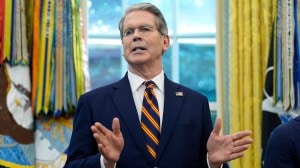Haunted by big, brown cloud, India now wants world to look elsewhere
India has a tough job on its hands as it wants the rest of the world to see through the haze of the Asian Brown cloud (ABC). In the crucial ...

India has a tough job on its hands as it wants the rest of the world to see through the haze of the Asian Brown cloud (ABC). In the crucial meet of 120 country ministers which starts in Nairobi on Monday, India’s first strategy was to get ABC dropped from the agenda.
When it failed, the government is now planning to move in an alternate draft that will ask the United Nations Environment Programme (UNEP) to take up further study around the globe instead of just limiting it to the Indian Ocean.
It had generated enough heat when UNEP released a report last year claiming that a dirty cloud — made of dust particles and aerosols — stretching over miles hangs over the Indian Ocean. It was formed because of inefficient combustion from factories, vehicles, burning trees and smoke from wood-burning and dung-burning stoves.
When the permanent representative in Nairobi was unable to get it deleted from the agenda, the foreign secretary was asked to generate political support among like-minded countries like China and Indonesia to ensure that draft decision on ABC is dropped in the forthcoming session.
In a meeting held by the secretary Ministry of Environment and Forests, just before their departure, it was decided that in case it is not dropped, an alternate draft has to be moved in quickly.
‘‘While it is the job of the UNEP to inform and warn of impending environmental solutions, it is not supposed to be alarmist,’’ says the note prepared by the Indian government to its delegation.
India’s worst fears are that the developed countries will use ABC as an excuse to take up stringent measures that will have economic and social implications for India. The government claims that it is more of a political issue than an environmental one.
In this five-day meet in Nairobi of the Governing Council/Global Ministerial Environment Forum, country representatives have gathered to prepare the agenda for managing the World’s environment for the next two years. UNEP would also be tabling the draft of the ‘State of the Environment’ report that has a chapter dedicated to ABC.
Scientists were split right down the middle when this report was released in London last August by Klaus Toepfer, UNEP executive director, saying that it has a profound impact on human health, crop yields and rainfall pattern of the subcontinent.
The Environment and Forest Minister, T R Baalu, immediately issued a statement saying that it had been it was an ‘‘alarming report and not scientifically substantiated’’. The report had been brought about by 250 of world’s leading scientists and 21 Indian scientists. A P Mitra, one of those who had done the report, said that it was a preliminary report and never meant to be exhaustive.
It will be clear in the next five days how much of support India is able to garner for the ABC issue internationally.
Photos





- 01
- 02
- 03
- 04
- 05


























